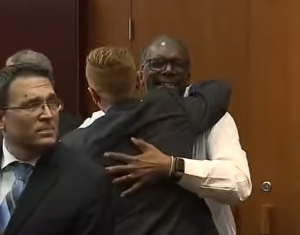Introduction
In a case that has spanned over a decade, three former security guards from Northland Mall were acquitted of all charges related to the 2014 death of McKenzie Cochran. The verdict, delivered on the fifth day of the trial, comes after years of legal scrutiny, with the jury ultimately finding the defendants not guilty of involuntary manslaughter.

Background of the Incident
The incident in question occurred on January 28, 2014, at Northland Mall. McKenzie Cochran, a 25-year-old man, was reportedly asked to leave the mall after he made a threat, stating that he wanted to kill someone. Cochran refused to leave the premises, prompting mall security to intervene. According to the details presented during the trial, the situation escalated quickly when Cochran resisted the security guards’ attempts to escort him out. The guards resorted to using mace on Cochran, leading to a struggle where five security guards restrained him face down.
During this altercation, Cochran repeatedly told the guards that he could not breathe. Despite his pleas, the guards continued to hold him down, leading to Cochran’s death. His death was later ruled accidental. For several years, no charges were brought against the security guards involved in the incident.
Reexamination and Charges
It wasn’t until 2021, seven years after the incident, that the case was reexamined by the Attorney General. This reexamination led to charges being filed against four of the security guards involved, accusing them of involuntary manslaughter. The guards charged were John Seiberling, Gavin King, Aaron Murray, and Lucius Hamilton. Notably, Hamilton had already pleaded guilty before the trial began, while another guard involved had passed away before any charges were brought against him.
The charge of involuntary manslaughter carried a potential prison sentence of 15 years. The prosecution argued that the guards failed to use common sense during the incident, especially when Cochran repeatedly stated that he couldn’t breathe. The prosecution’s stance was that the guards should have repositioned Cochran to prevent any further harm.
Defense and Trial Proceedings
The defense attorneys, however, painted a different picture of the events. They argued that McKenzie Cochran was the aggressor in the situation, refusing to comply with the guards’ orders and continuing to resist even after being asked to leave the mall. The defense emphasized that Cochran had made a serious threat to kill someone in a public space, which was filled with customers at the time.
They also questioned the timing and the basis of the charges, noting that it had been ten years since the incident occurred. One of the key points raised by the defense was the constitutional right to a speedy trial, arguing that the delay in bringing charges was indicative of a lack of sufficient evidence.
During the trial, the defense worked to establish that there was reasonable doubt regarding the guards’ culpability in Cochran’s death. They highlighted that the initial investigation had not led to charges and that the reexamination years later did not uncover new evidence that would justify a conviction.
Verdict
After deliberating for just over an hour, the jury returned a verdict of not guilty for each of the three defendants. The swift decision by the jury suggests that they were convinced by the defense’s arguments about the lack of evidence and the context of the incident.
The acquittal of the three former security guards brings to a close a legal saga that has persisted for over a decade. The case has raised significant questions about the responsibilities of security personnel in high-stress situations, the use of force, and the lengthy delay in bringing charges against those involved. However, with the jury’s decision, the legal proceedings in this matter have concluded, and the guards involved have been cleared of all charges related to McKenzie Cochran’s death.
Conclusion
The not guilty verdict in this case reflects the complexities involved in assessing the actions of security personnel during volatile situations. While the case will likely continue to be a point of discussion, particularly in regards to the legal processes that delayed the trial, the jury’s decision underscores the importance of reasonable doubt in the American legal system.














